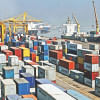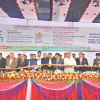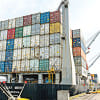Export earnings drop after four months

Export earnings dropped for the first time in five months in March because of a slowdown in the global economy following the severe impacts of the Russia-Ukraine war and Covid-19, official figures showed yesterday.
Exporters brought home $4.64 billion last month, down nearly 2.5 per cent from a year earlier, according to the Export Promotion Bureau (EPB).
The overall export earnings were in the positive territory between July and March of the current fiscal year with receipts growing 8.07 per cent year-on-year to $41.72 billion.
The pace of growth has been far below than posted in the last financial year when it stood at 33 per cent.
Except for the apparel sector, which typically contributes 84 per cent to national exports, almost all sectors performed poorly in the first nine-month of the financial year.
Garment export grew 12.17 per cent to $35.25 billion. Of the sum, $19.13 billion came from the knitwear sector, registering 11.78 per cent growth from a year earlier.
Another $16.11 billion came from the shipment of woven items, which posted a growth of 12.63 per cent.
Faruque Hassan, president of the Bangladesh Garment Manufacturers and Exporters Association (BGMEA), said although the garment export is in positive territory, it declined more than 1.04 per cent month-to-month.
"The slowdown in apparel shipment indicates that earnings may not be good in the coming days like we posted in recent months," he said.
He warned that if the war persists, the export may be in trouble.
Russia's war in Ukraine shows no sign of coming to an end.
According to Hassan, even in the peak season of sweater shipment, the shipment was slowing.
He said international retailers and brands have started sourcing a lower volume of products from the country because of higher inflation in the western economies and the higher bank interest rate.
Headline inflation in the eurozone fell to 8.5 per cent in February, down from 8.6 per cent the previous month. In the US, the consumer price index increased 0.4 per cent last month, putting the annual inflation rate at 6 per cent.
Last week, A K Azad, a top garment exporter, said orders declined by 20 per cent for the next season at his factory because of the volatile economic situation in the destinations such as Europe and the US.
A pile-up of old stocks of apparel items at the store level is also an issue as consumers in the developed world have tightened belts amid the persisting cost-of-living crisis.
Saiful Islam, president of the Metropolitan Chamber of Commerce and Industry, said the overall buying capacity of consumers has eroded amid higher inflation.
"Consumers are not buying anything other than essential items," said Islam, also the managing director of Picard Bangladesh Limited, one of the leading leather products exporters.
Leather and leather goods exports rose 2.5 per cent year-on-year to $919 million in July-March of FY23.
The export of frozen and live fish decreased 20.5 per cent to $346.55 million and agricultural products export declined 28.31 per cent to $687.09 million, EPB data showed.
Jute and jute goods export dipped 21.23 per cent to $698.7 million and home textile shipments declined by 25.73 per cent to $859.94 million.
Abdur Razzaque, research director of the Policy Research Institute, said the collapse of major banks in the US and in Europe and the high bank interest rates in the major export destinations are some concerns for the near future.
He, however, said Bangladesh has performed better in exports compared to other countries given the global economic situation.
Besides, there are some positive trends in the global economy and the recession might not be as deep in the western world as had been thought earlier.
"The US-China trade war is intensifying. This will shift more work orders from China to Bangladesh," he said.
BGMEA's Hassan said the government should disburse Tk 1,500 crore in unpaid export incentives to factory owners so that they can pay bonuses and other festival allowances to workers ahead of Eid-ul-Fitr.
The Bangladesh Knitwear Manufacturers and Exporters Association has already submitted a proposal to the finance ministry demanding unpaid incentives ahead of the festival.

 For all latest news, follow The Daily Star's Google News channel.
For all latest news, follow The Daily Star's Google News channel. 








Comments